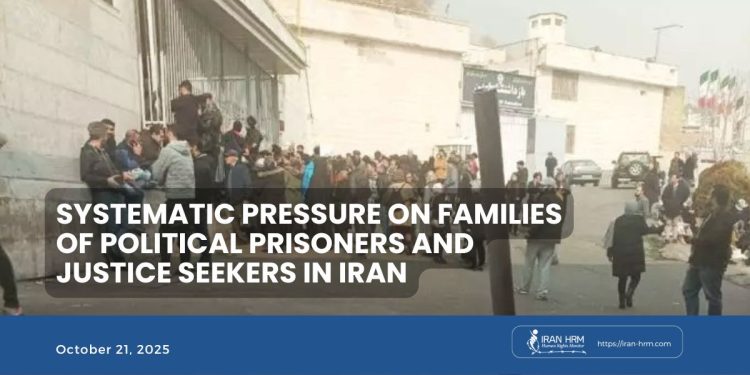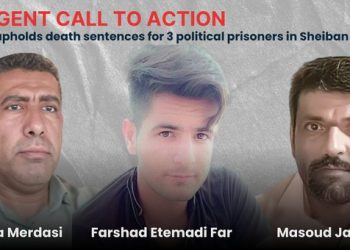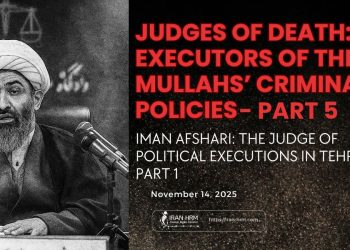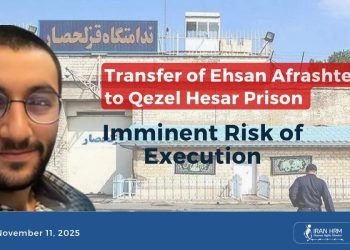In recent years, a new wave of repression has targeted families of political prisoners and justice seekers across Iran. Many of these families, who have spent decades searching for truth and justice for their loved ones, now face persecution themselves for their persistence.
This policy blatantly violates the fundamental principle of individual criminal responsibility, which holds that no one should be punished or harassed for the actions or beliefs of another person.
Applying threats, restrictions, or reprisals against families with no personal charges constitutes an explicit form of collective punishment—a practice expressly prohibited under international law.
Architecture of Repression
Numerous accounts indicate that these abuses are not isolated incidents but part of a coordinated security policy.
The Ministry of Intelligence, the IRGC’s Intelligence Organization, the Prosecutor’s Office, and the Prisons Organization play complementary roles in implementing this pressure.
Families have reported threatening phone calls, informal summonses, and short-term detentions. Security agents have warned them that if they speak publicly about their loved ones or contact international bodies, prisoners will be sent to solitary confinement or denied medical treatment.
Such acts not only violate the law but are calculated efforts to instill fear and enforce collective silence.
Documented Cases
The Akbari Monfared Family
The Akbari Monfared family stands among the most prominent examples of enduring repression in Iran. Three generations have faced imprisonment, exile, or deprivation of basic rights.
Currently, Amir Hassan Akbari Monfared is held in Fashafouyeh Prison, his father Mohammad Ali Akbari Monfared is under heavy security supervision in a hospital despite severe illness, and his sister Maryam Akbari Monfared remains imprisoned in Qarchak Prison, Varamin.
The family has repeatedly faced intimidation, and each public disclosure about their condition has triggered intensified security pressure.
The Family of Shiva Esmaeili and Mohammad Javad Vafaei Sani
Shiva Esmaeili, mother of two political prisoners, and her cousin Mohammad Javad Vafaei Sani have been subjected to severe persecution by security institutions.
Esmaeili was arrested and imprisoned in Tehran, while her cousin remains detained in Mashhad under a death sentence.
Her two sons—Seyed Mehdi Vafaei Sani (serving six years) and Seyed Alireza Vafaei Sani (serving five years)—are both incarcerated in Ward 8 of Evin Prison.
This imprisoned mother has been denied the basic human right to communicate with her sons.
The simultaneous detention of multiple family members is a textbook case of collective punishment designed to inflict psychological suffering and deter others from speaking out.
The Sediqi Family and Kurdish Prisoners
In Kurdistan, families of Kurdish political prisoners, including that of Salar Sedighi, have repeatedly faced interrogations and threats.
Salar Sedighi’s transfer to remote prisons and the denial of visits have placed immense emotional and financial strain on his family—one among dozens of similar cases across Kurdistan, Sistan-Baluchestan, and Khuzestan.
Mohammad Bonazadeh Amir Khizi: The Enduring Burden of Justice-Seeking Families
Seventy-nine-year-old Mohammad Bonazadeh Amir Khizi, from a family victimized in the 1980s, exemplifies the regime’s long-term persecution of justice-seeking generations.
After spending more than a decade in Evin and Gohardasht prisons, he was re-arrested in 2021 despite his age and poor health.
His case illustrates the regime’s relentless vengeance against those associated with the justice-seeking movement, regardless of age or circumstance.
Escalating Pressure on Justice-Seeking Families
Families from Tehran, Mashhad, Sanandaj, Tabriz, and Rasht report being banned from holding memorials or speaking with media outlets.
Many have been summoned and threatened with arrest if they continue publicizing their relatives’ cases.
In several instances, security forces prevented attendance at funerals or mourning ceremonies.
These measures are not isolated reactions but deliberate policies to suppress justice-seeking voices and erase collective memory.
Human and Psychological Dimensions
Despite continuous threats, the families of political prisoners remain resilient.
Mothers, spouses, and children continue to advocate for their loved ones, ensuring their voices reach beyond prison walls.
Their steadfastness under such pressure reflects the living conscience of Iranian society—proof that the pursuit of justice cannot be silenced.
Legal Analysis
Targeting families of prisoners directly violates multiple provisions of the International Covenant on Civil and Political Rights (ICCPR):
- Article 7: Prohibits torture and cruel or inhuman treatment; threats and psychological harassment constitute mental torture.
- Article 9: Prohibits arbitrary arrest; summoning and detaining family members without charges violate this article.
- Article 10: Requires humane treatment of detainees; using families as leverage contradicts this obligation.
- Article 23: Protects family unity; transferring prisoners to distant facilities and denying visitation clearly breach this protection.
These documented patterns demonstrate a deliberate policy of persecution that may qualify as crimes against humanity under international law.
International Reactions (2019–2025)
Amnesty International (June 2019)
Amnesty International denounced the Iranian authorities for “denying the right to truth and burial” to families of the 1988 massacre victims, describing such actions as a violation of the absolute prohibition on torture and inhuman treatment under the UN Convention Against Torture.
The report stated that “the suffering caused to a family by the disappearance of their loved ones, the secrecy surrounding the execution date and place of burial… amounts to a violation of the prohibition on torture.”
Amnesty International and Partner Organizations
In a joint statement Amnesty International and several human rights NGOs urged the Iranian authorities to end their “ruthless campaign of harassment and intimidation against families of those who died in suspicious custody.”
They emphasized that reprisals and threats against these families constitute acts of persecution and violate Iran’s obligations under international human rights law.
UN Special Rapporteur on Iran
In his 2024 report, UN Special Rapporteur Javaid Rehman concluded that systematic pressure on families of detainees and victims of protests amounts to a violation of their right to justice and truth.
He urged the creation of a permanent UN mechanism to document and prosecute those responsible for such abuses.
UN Fact-Finding Mission (FFM)
In its 2025 final report, the UN Fact-Finding Mission highlighted that “pressure for silence” and “transnational repression through family intimidation” are integral parts of the regime’s systematic campaign of persecution.
The Mission defined these practices as repression by proxy targeting both activists and their relatives.
FIDH (International Federation for Human Rights)
The FIDH and the League for the Defense of Human Rights in Iran have repeatedly condemned the regime’s “prison-in-exile” policy—transferring prisoners to remote facilities—as a form of collective punishment.
They warned that families speaking publicly about their relatives’ conditions face escalating intimidation.
Conclusion and Call to Action
The systematic pressure on families of political prisoners and justice seekers in Iran represents a deliberate, organized form of repression aimed at imposing silence and fear across society.
This policy constitutes a flagrant violation of human dignity and amounts to psychological torture and collective punishment.
The international community must recognize these actions as potential crimes against humanity and use all available UN mechanisms to ensure accountability.
Ending this policy is an essential step toward restoring justice and the right to truth in Iran.







